Just a few months ago we reviewed the Infinix HOT 10S, and we thought that besides its shortcomings, it was still a solid daily driver for its below PHP 6,000 price tag. Now, Infinix is back with this HOT 11S and it sure got notable upgrades while still maintaining an entry-level price. We’ve been using this for some days now and let’s see if this is the phone for you. Keep on reading for our full review.

Design and Construction
Coming in with a refined design, the Infinix HOT 11S has a wavey pattern at the back that gives a gradient look when viewing the phone from different angles. Upclose, you’ll also see some subtle shimmers that actually give a graphite illusion.
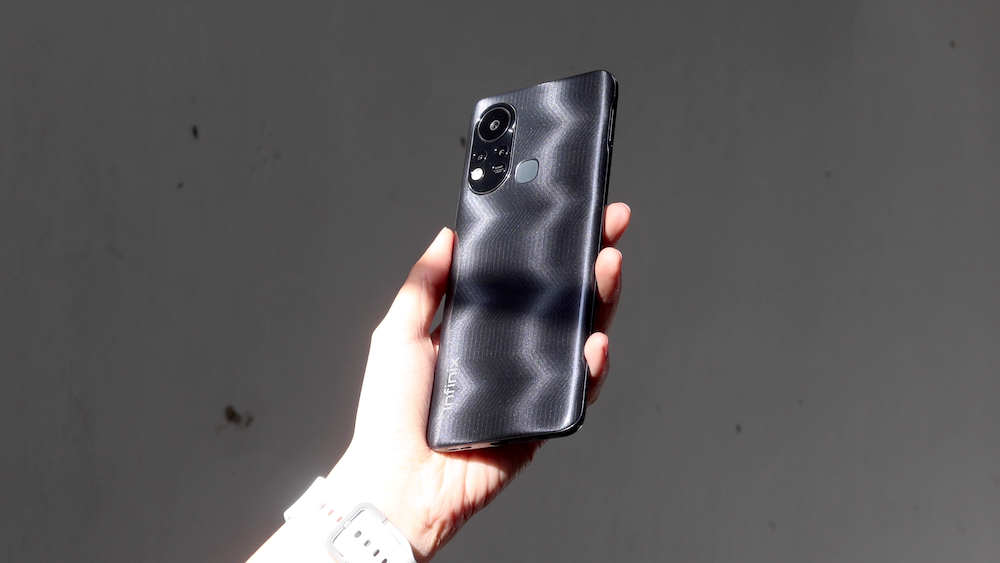
On the upper left is its protruding oblong-shaped camera module that houses the triple rear cameras and quad-LED flash. Also found here at the back are its fingerprint scanner and a simple Infinix logo.
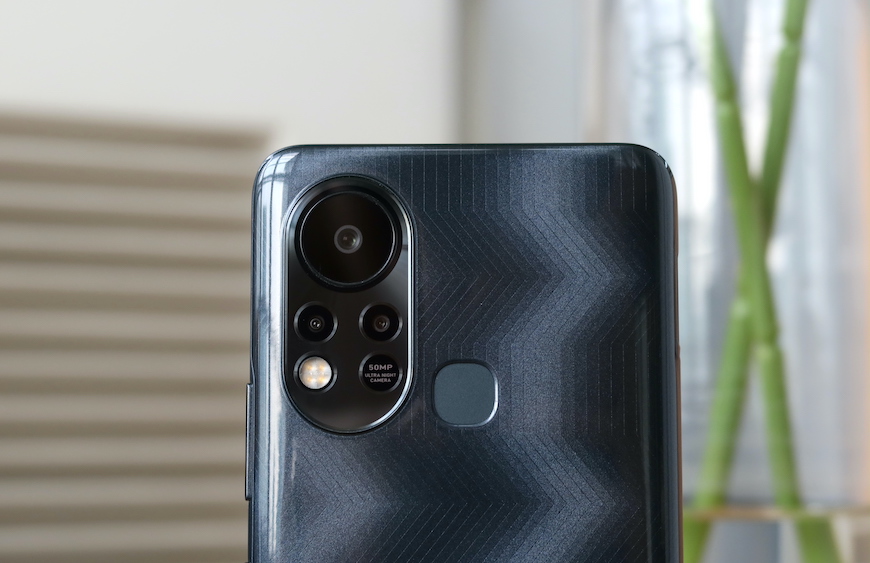
From afar, it can be mistaken with a glass build. However, when holding the phone, you’ll immediately notice its all-plastic curved body with a glossy finish that’s insanely prone to fingerprint smudges—so we highly suggest placing a case on. Now despite the plastic material, the HOT 11S is rather hefty at 205g, but nonetheless, it’s still comfortable to grip. What we have here is in the Polar Black color, but it also comes in either Green Wave or 7° Purple.
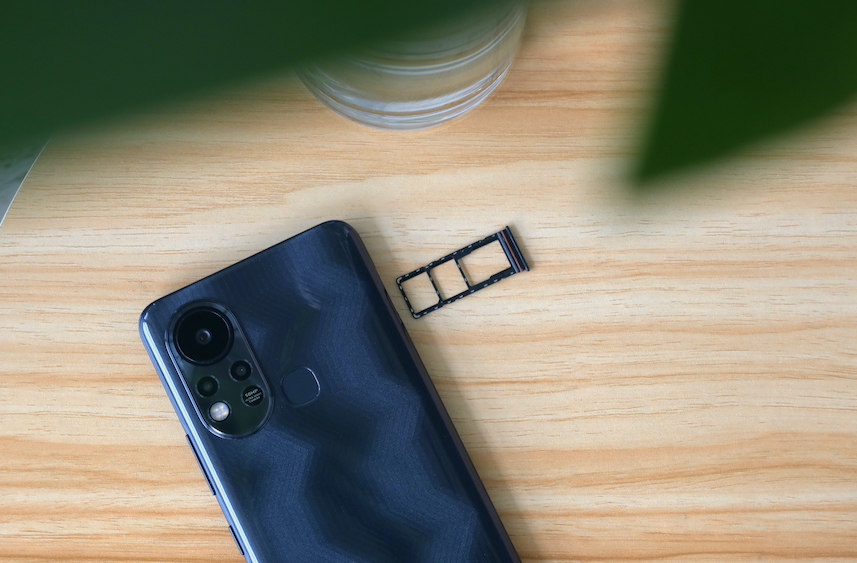
Situated on the left side is a triple card slot for two nano-SIM cards and a microSD card for up to 256GB.

Meanwhile on the right are the volume rocker and the power button that are all easy to reach.

There’s nothing on top but there is a slogan embedded that says “The future is now”.

Then heading over to the bottom, we get a 3.5mm audio jack, primary microphone, main loudspeaker, and a USB-C port which is nice to see since the HOT 10S still had a micro-USB port.
Display and Multimedia

Upfront, the Infinix HOT 11S sports a 6.78-inch IPS LCD display with fairly slim bezels and a punch hole notch on the upper middle, right below the earpiece. It’s a slightly smaller display compared to its predecessor, but this seems to be a tab bit more vibrant. Specifically, it has a resolution of 2480 x 1080px, a pixel density of 399ppi, a 90Hz refresh rate option, and a 180Hz touch sample rate. It might not be as good as in an AMOLED screen, yet it still offers a smooth and bright display with punchy colors and decent viewing angles.

Overall, this display is alright. It’s something you’d expect in its range, and it’s good enough for browsing through your social media apps, gaming, and streaming videos. For protection, it has a layer of NEG Dinorex T2X-1 glass and a pre-installed screen protector on top.
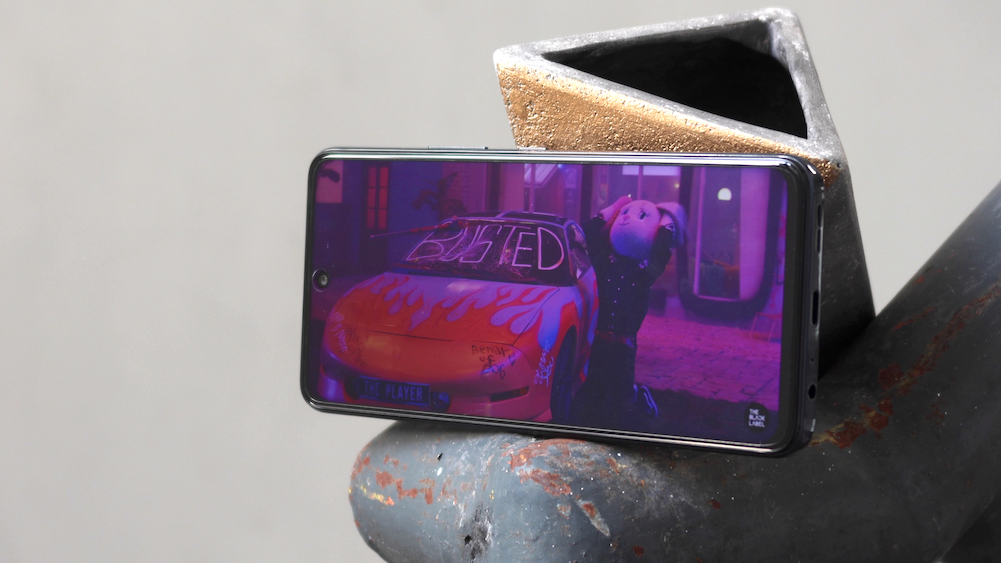
In the display settings, you can turn on the dark theme if you prefer, toggle the refresh rate to 60, 90, or auto switch; then you can also adjust the touch sensitivity and speed. Additionally, from the drop-down control center, you can use the Peek Proof button that will trigger a transparent black layer on the display so your screen isn’t easy to read for people around you.

As for audio, similar to other Infinix smartphones, it’s backed with DTS Sound for a better audio experience so you can customize the equalizer if you like.
We get a dual stereo speaker set up that can surprisingly get loud enough for a small room without sounding too tinny. Then again, the quality is fair within the highs and mids, but not so much on bass.
Cameras
Its triple setup at the back is composed of a high 50MP main, a 2MP depth, and an unspecified AI lens. Then for selfies, it has an 8MP front shooter.

The camera app is a lot similar to most Android smartphones today so getting around shouldn’t be a hassle. It has additional nifty features such as short video, beauty, portrait, super night, Google Lens, and you can use the fingerprint sensor as a quick shutter button.
Quality-wise, shots taken with the rear camera often look well-detailed with good colors under good lighting conditions. It also produces very good HDR once you focused it correctly. However, sometimes you might want to take more shots since they can be overexposed.
Its standard mode gives a nice depth effect, giving some professional-looking photos. And generally, there’s not much difference when you use the high 50MP lens, but of course, you can expect higher quality if you ever need it. You can manually zoom in from 2x, 5x, and up to 10x, and even so, it can still show good undistorted details.
As for night photography, its super night mode can make night shots look brighter and more detailed, plus we like how it doesn’t take too long to take a shot.
When it comes to selfies, under good lighting conditions, you can expect sharp details with still a soft effect on skin tones. Take note that It falls more on cooler tones. But either way, they’re still pretty good for social media posts.
As for videos, you can shoot from 720p, 1080p, and up to 2K without any stabilization on board. There are more camera features here that you can tweak around with such as AR Shot, Slow Motion, Panorama, Documents, and Time-lapse
OS, UI, and Apps
Software-wise, the Infinix HOT 11S runs on Android 11 skinned with XOS 7.6. From the get-go, there’s a lot of things going on. It’s bombarded with bloatware and some pre-installed apps that you most likely won’t use, but you can uninstall the majority of them anyway.

Personally, I’m not a fan of the default UI look, but thankfully Infinix has numerous free themes in the XTheme app that definitely looks better. There are also free wallpapers and fonts here that I know a lot of people can appreciate. Still, in the XTheme app, you can also customize the animation for whenever someone calls you, and it’s called Video Show.
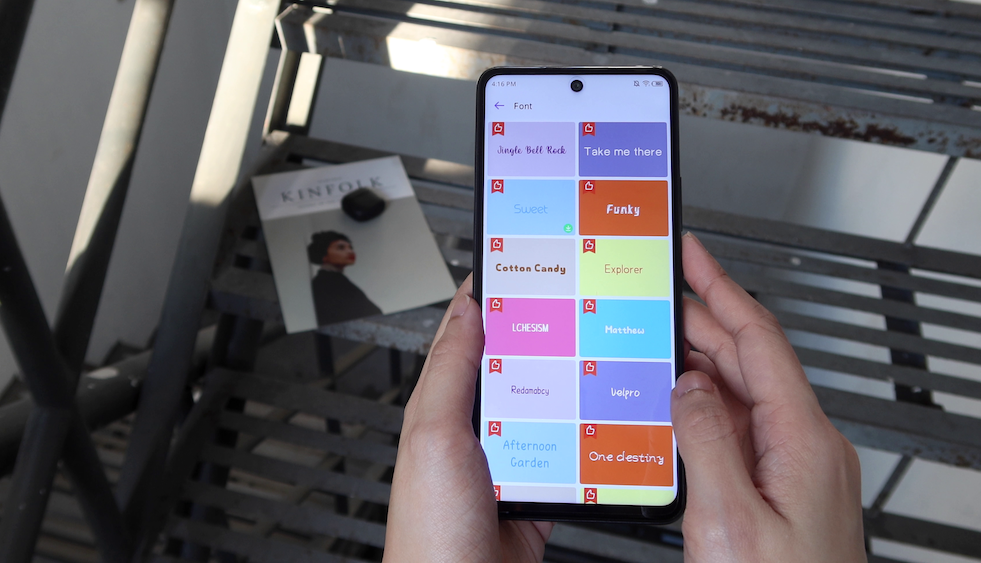
For other features, there’s app lock, app freezer, social turbo for WhatsApp, clone apps, multi-window, and digital wellbeing & parental controls.
The HOT 11S is available in either 64GB or 128GB of internal storage. The unit we have has 64GB, and we get a usable 50GB out of the box. You can expand it through the dedicated microSD card slot if you still need more space.
Performance and Benchmarks
Powering the Infinix HOT 11S is a MediaTek Helio G88 chipset together with a Mali-G52 MC2 GPU and 4/6GB of RAM. What we have packs 4GB of RAM.
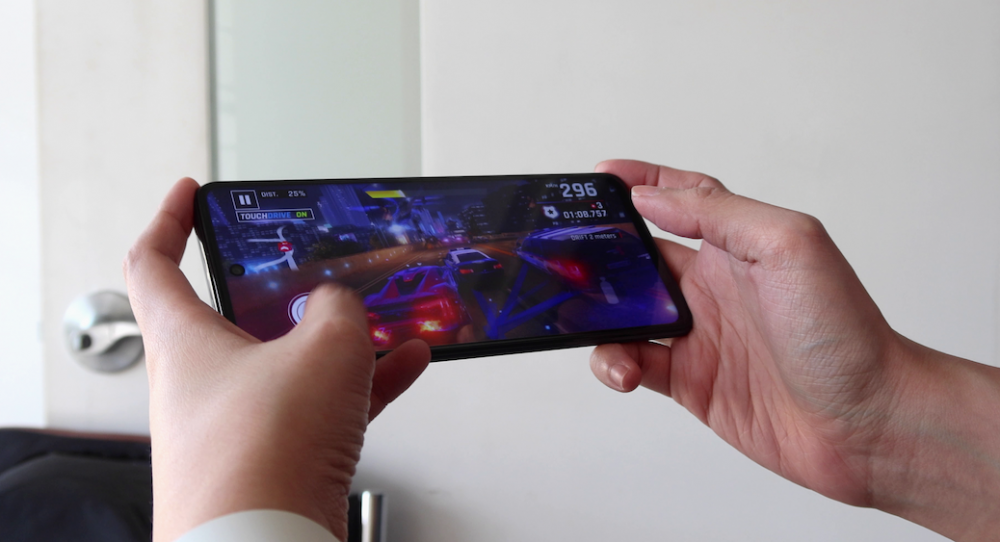
The performance isn’t that big of a leap from the HOT 10S’ internals, but it is still an upgrade and it can deliver well for basic to moderate day-to-day use like web browsing, video streaming, messaging, and calling.

For gaming, there’s a Game Mode in the settings that you can turn on for a boost and quick assistance. This phone can handle graphically intensive games such as Genshin Impact Pokemon Unite, and Asphalt 9 in low to medium settings. It does heat up when used for extended periods of time, but not to an alarming level.
If you’d like to see the benchmark scores that we got, we’ll flash them now.
- AnTuTu v9.1.8 – 218,412
- AnTuTu v9.1.8 Storage Test – 14,535 (318.4MB/s Seq. Read, 166.0MB/s Seq. Write)
- 3DMark – 718 4.30 FPS (Wild Life)
- PC Mark – 8,817 (Work 3.0)
- Geekbench 5 – 365 (Single-Core), 1,339 (Multi-Core), 1,219 (OpenCL)
- AndroBench – 315.52 MB/s (Seq. Read), 197.55 MB/s (Seq. Write)
For security, you can unlock the device via face-unlock and the side-mounted fingerprint scanner. The fingerprint scanner responds quickly, while the face-unlock works well, with some struggle under low-light scenarios.
Connectivity and Battery Life
The Infinix HOT 11S comes with 4G LTE, Wi-Fi, Bluetooth 5.0, GPS, screencast, and there’s also an FM Radio app pre-installed.

When it comes to battery, we get a lower 5000mAh capacity compared to the 6,000mAh capacity on the Infinix HOT 10s. Nonetheless, this is compensated with its 18W fast charging tech, since its predecessor still had a micro-USB port and a 10W adapter.

We ran it through the PCMark’s Work 3.0 battery test while the 90Hz is turned on and it got a decent 9 hours and 26 minutes. Meanwhile, in our standard video loop test wherein we loop a 1080p video at 50% brightness, 0% volume, airplane mode turned on, and at 60Hz refresh rate, the HOT 11S yielded 12 hours and 14 minutes which should be enough for a whole day if you’re not a heavy user.
Conclusion
Okay, let’s finally talk about price. The Infinix HOT 11S is available in two configurations: the 4GB + 64GB is available for PHP 6,990, while the 6GB +128GB is priced at PHP 7,990. For its price, I can say that it’s worth your money, but for the extra PHP 1,000, you’ll get more with the 6GB+128GB variant. If you are to buy this phone, make sure to manage your expectations. It’s not highly dedicated to gaming, but it is a reliable daily driver for casual use. The battery did get a slight downgrade from its predecessor, but it’s well compensated with the USB-C 18W fast charging.

And that wraps up this review! Share with us what you think about this Infinix HOT 11S in the comments. Would you buy one? Let us know too.
Infinix Hot 11S specs:
6.78-inch FHD+ (2480 x 1080) IPS LCD
90Hz refresh rate, 180Hz touch sample rate
NEG Dinorex T2X-1 Glass Protection
MediaTek Helio G88
4GB RAM
64GB storage
up to 256GB microSD (dedicated)
Triple rear cameras:
• 50MP (main)
• 2MP (depth)
• AI lens
8MP front camera
4G LTE
Dual-SIM (nano)
WiFi 802.11 a/b/g/n
Bluetooth 5.0
GPS, A-GPS
Fingerprint scanner (rear)
XOS 7.6 (Android 11)
USB Type-C
5,000mAh battery
168,9 x 77 x 8.82mm
205g
Green Wave, Polar Black, 7 Purple
The post Infinix HOT 11S Review appeared first on YugaTech | Philippines Tech News & Reviews.
Source: Yugatech


No comments:
Post a Comment